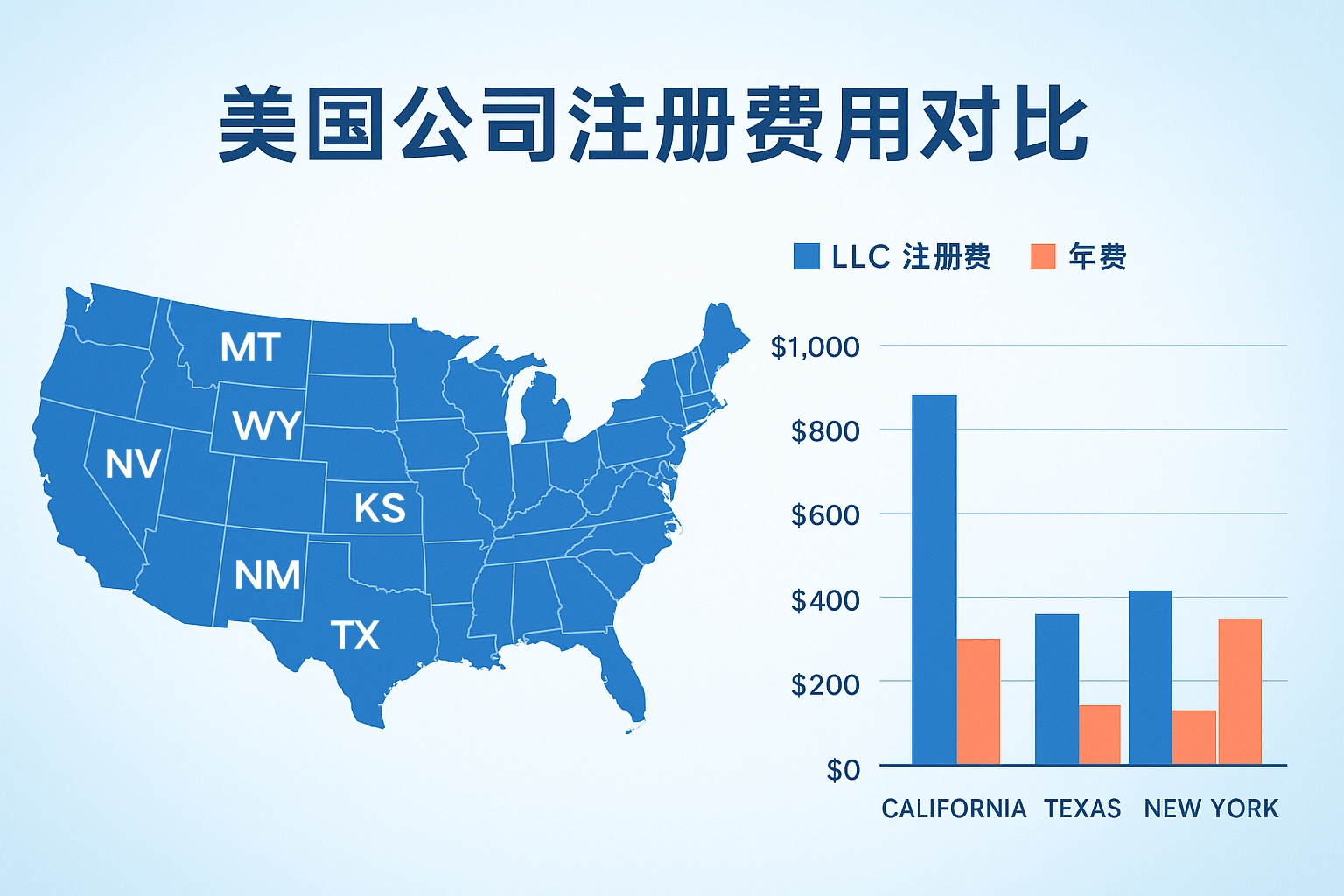Register a US Company – US Company Registration Process,Fees & Tips

 If you’re planning to start a business in the U.S. and are considering registering a company, you’re likely wondering about the registration process and the associated costs. While the procedure is generally straightforward, the U.S. company registration fees can vary depending on the state in which you choose to incorporate. In this blog post, we’ll walk you through the steps of registering a U.S. company, explain the registration costs, and highlight factors that may affect your fees based on your state of incorporation.
If you’re planning to start a business in the U.S. and are considering registering a company, you’re likely wondering about the registration process and the associated costs. While the procedure is generally straightforward, the U.S. company registration fees can vary depending on the state in which you choose to incorporate. In this blog post, we’ll walk you through the steps of registering a U.S. company, explain the registration costs, and highlight factors that may affect your fees based on your state of incorporation.
Step 1: Choose Your Business Structure
The first step in registering a U.S. company is choosing the right business structure. The most common types of business entities are:
- Limited Liability Company (LLC): A flexible structure that provides personal liability protection and tax advantages.
- Corporation (Inc.): A more formal structure with separate legal status, offering shareholders limited liability protection.
- Sole Proprietorship: A simple structure, though it doesn’t offer the same level of liability protection as an LLC or Corporation.
Most foreign entrepreneurs choose either an LLC or Corporation, depending on their business needs and tax strategy.
Step 2: Select Your State of Incorporation
The state in which you choose to register your US company will impact both the registration process and the costs. While Delaware, Wyoming, and Nevada are popular choices due to favorable tax laws and business-friendly regulations, states like California and New York may have higher fees and more complex regulations.
Each state has its own business registration process and filing fees, which can significantly differ from one state to another. For instance:
- Delaware: Known for its business-friendly laws, Delaware charges a relatively low filing fee of around $90 for an LLC, but businesses must pay an annual franchise tax.
- California: California charges a minimum of $70 for LLC formation, but the state imposes a higher annual franchise tax ($800).
- Wyoming: One of the most affordable states, Wyoming charges a filing fee of about $100 for an LLC, and no state income tax.
When selecting your state, it’s essential to consider not just the registration fees but also annual maintenance fees, taxes, and the specific legal requirements for each state.
Step 3: Register Your Company
Once you’ve chosen your business structure and state, it’s time to submit your formation documents to the state’s Secretary of State. This typically involves filing the following:
- Articles of Incorporation (for Corporations) or Articles of Organization (for LLCs).
- Operating Agreement (for LLCs): This is not always required but is highly recommended for clarity on the company’s operations and management.
- Employer Identification Number (EIN): This number is required for tax purposes and is obtained through the IRS. It’s necessary if you plan to hire employees, open a U.S. business bank account, or file taxes.
You can file these documents online through your state’s official business website or by using a third-party service provider. Online filing is often quicker and cheaper than paper filing.
Step 4: Pay the Registration Fees
As mentioned, the costs for registering a U.S. company can vary depending on the state. Typical fees include:
- Filing Fees: The costs for submitting your formation documents. These range from $50 to $500, depending on the state.
- Registered Agent Fees: In most states, you’ll need to appoint a registered agent who will be your company’s official point of contact. Registered agent services typically cost around $100 to $300 per year.
- EIN Application Fee: While applying for an EIN with the IRS is free, some service providers charge a fee to handle the application for you (usually around $50 to $150).
Step 5: Annual Maintenance Fees
Once your business is officially registered, you will need to maintain it. Some states require businesses to submit annual reports and pay annual fees, which can vary widely. For example:
- Delaware: Requires an annual franchise tax (ranging from $175 to several thousand dollars, depending on company size) and an annual report.
- California: Has an annual franchise tax of $800, regardless of whether your business is profitable.
- Wyoming: Only requires a small annual fee to maintain your LLC (about $50).
In addition, you may need to file state-specific tax forms, renew your business licenses, or submit reports to ensure that your company remains in good standing.
Step 6: Additional Costs to Consider
Depending on the nature of your business, you may incur additional costs for:
- Business Licenses and Permits: Depending on your industry, you may need a federal, state, or local business license. Costs vary by business type and location.
- Bank Account Setup Fees: If you plan to open a U.S. business bank account, there may be setup fees. Generally, these fees range from $25 to $100.
- Legal and Accounting Fees: Depending on the complexity of your business, you may need to consult legal or accounting professionals, especially for matters like intellectual property protection, tax planning, and compliance.
Conclusion: How to Save on U.S. Company Registration Costs
The cost to register a U.S. company depends on several factors, such as the state you choose, the business structure, and any additional services you may need. By researching each state’s fees and requirements, you can make an informed decision that suits your business goals and budget.
If you’re looking for a simple, affordable way to get started, states like Delaware and Wyoming are excellent choices. However, if you plan to have a physical presence or significant operations in a state like California or New York, the higher fees may be justified by the local market advantages.


+8618038173631


hi@easytaxs.com


StartBizUSA

Please scan WeChat QR code for professional service
STAY IN THE LOOP
Subscribe to our free newsletter.
For many entrepreneurs, registering a company in the US is a key step toward launching a new business chapter and entering the global market. However, one of the most practical and confusing questions is: How much startup capital is actually needed? The answer varies greatly,it depends on which state you choose to register in. Each
When you register a US company, you typically incorporate in one state. As your business grows, you may want to expand into other states. This is where interstate business operations come into play. A common question arises: Do I need to register a new company in another state?Legally, this process is called Foreign Qualification. If
Registering a US company in 2025 is undoubtedly one of the top choices for entrepreneurs and business owners looking to expand overseas. The US market, with its massive consumer base, mature capital markets, flexible tax system, relatively simple company registration process, low maintenance costs, strong intellectual property protection, and transparent legal framework, continues to attract
Every year, over 30% of Chinese business owners get into trouble due to confusing US company annual report with US company tax filing, resulting in company dissolution, frozen cross-border e-commerce accounts,or fines. This article will break down the essential differences in plain language, helping you maintain compliance in your cross-border business. US Company Annual Report








